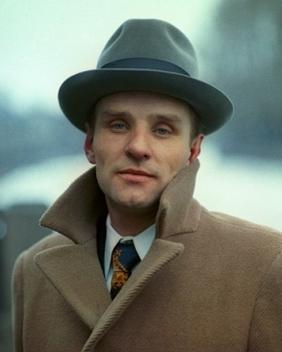Anatoly (Otto) Alekseyevich Solonitsyn (Russian: Анатолий (Отто) Алексеевич Солоницын; 30 August 1934 – 11 June 1982) was a Soviet actor known for his roles in Andrei Tarkovsky's films.[1] He won the Silver Bear for Best Actor at the 31st Berlin International Film Festival.
Anatoly Solonitsyn | |
|---|---|
 | |
| Born | Otto Alekseyevich Solonitsyn 30 August 1934 |
| Died | 11 June 1982 (aged 47) Moscow, Russian SFSR, Soviet Union |
| Occupation | Actor |
| Years active | 1960–1982 |
| Awards | Silver Bear |
Film career
Solonitsyn was born in Bogorodsk. At birth, he was named Otto, after polar explorer Otto Schmidt.
His debut in cinema was in the Sverdlovsk Film Studio's short film The Case of Kurt Clausewitz (1963), directed by Gleb Panfilov. Solonitsyn is best known in the west for his roles in several of Andrei Tarkovsky's films, including Dr. Sartorius in Solaris (1972), the Writer in Stalker (1979), the physician in Mirror (1975), and the title role in Andrei Rublev (1966).
In his book Sculpting in Time, Tarkovsky calls Solonitsyn his favorite actor,[2] and writes that Solonitsyn was intended to play the lead roles in his films Nostalghia (1983) and The Sacrifice (1986), but the actor died before their production. Tarkovsky admired Solonitsyn's ability to fully embody the ideas of the director. When Tarkovsky was considering making a film adaptation of Dostoevsky's famous novel The Idiot, Solonitsyn was even ready to undergo plastic surgery to look more like the great Russian writer.[3]
In the former Soviet Union he is also well known for his roles in At Home Among Strangers (1974), The Train Has Stopped (1982), and many others.
Awards
In 1981, he won the Silver Bear for Best Actor at the 31st Berlin International Film Festival for his role in Aleksandr Zarkhi's film Twenty Six Days from the Life of Dostoyevsky.[4] The same year, he was given the title of Honored Artist of the RSFSR.
Death
Solonitsyn died from lung cancer in 1982, at the age of 47. Allegedly, according to Viktor Sharun, the sound editor on Stalker, Solonitsyn, Tarkovsky and Larisa Tarkovskaya became ill due to exposure to toxic chemicals during filming on the location of the movie.[5]
Filmography
| Year | Title | Role | Notes |
|---|---|---|---|
| 1966 | Andrei Rublev | Andrei Rublev | |
| 1968 | No Path Through Fire | Ivan Yevstryukov | |
| 1971 | Trial on the Road | Major Igor Leonidovich Petushkov | |
| 1972 | Grandmaster | Sergey's father | |
| 1972 | The Love of Mankind | Dmitry Andreyevich Kalmykov | |
| 1972 | The Prince and the Pauper | Lord Saint John | |
| 1972 | Solaris | Dr. Sartorius, astrobiologist | |
| 1974 | Agony | Baroness' husband, colonel | Released in 1981 |
| 1974 | At Home Among Strangers | Vasily Antonovich Sarychev | |
| 1974 | Under en steinhimmel | Hofmeyer, German colonel | |
| 1975 | Mirror | Forensic doctor, the passerby | |
| 1975 | Trust | Alexander Shotman | |
| 1976 | The Ascent | Pavel Gavrilovich Portnov, the Nazi interrogator | |
| 1977 | Bag of the Collector | Ivan Timofeyevich | |
| 1978 | The Turning Point | Konstantin Korolyov | |
| 1979 | The Bodyguard | Sultan-Nazar | |
| 1979 | Stalker | Writer | |
| 1980 | Life on Holidays | Tolik Chikin | |
| 1980 | Twenty Six Days from the Life of Dostoyevsky | Fyodor Dostoevsky | |
| 1981 | Muzhiki! | Pyotr the painter, Pavlik's father | |
| 1982 | The Train Has Stopped | Igor Malinin, journalist | Final film role |
References
External links
Wikiwand in your browser!
Seamless Wikipedia browsing. On steroids.
Every time you click a link to Wikipedia, Wiktionary or Wikiquote in your browser's search results, it will show the modern Wikiwand interface.
Wikiwand extension is a five stars, simple, with minimum permission required to keep your browsing private, safe and transparent.
